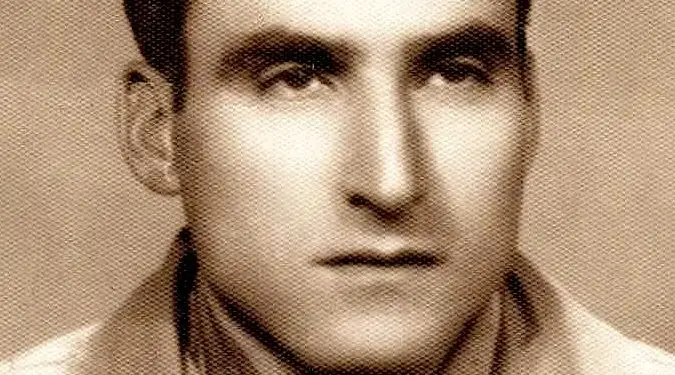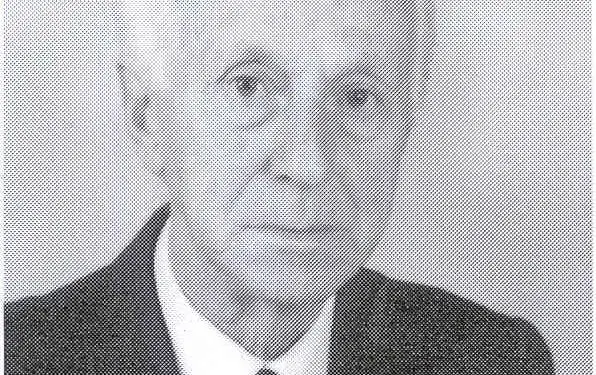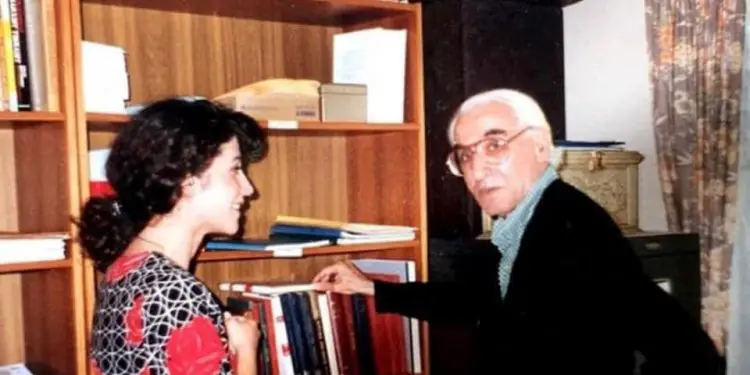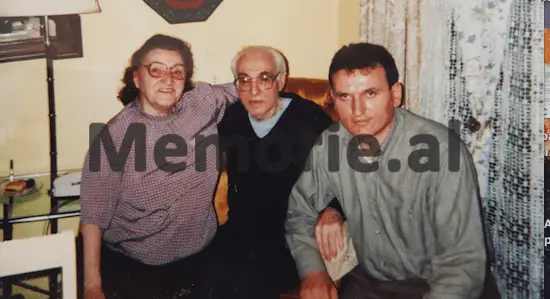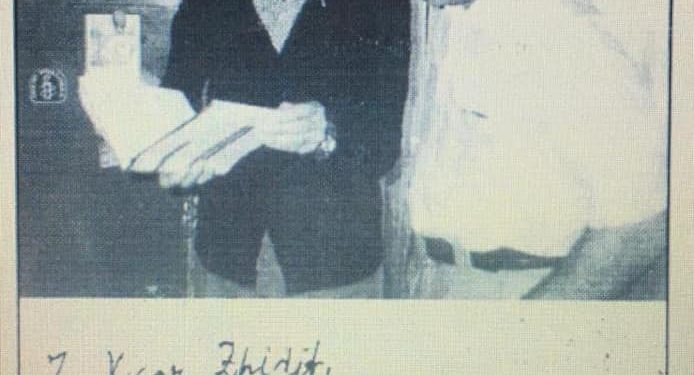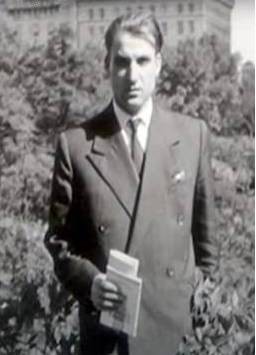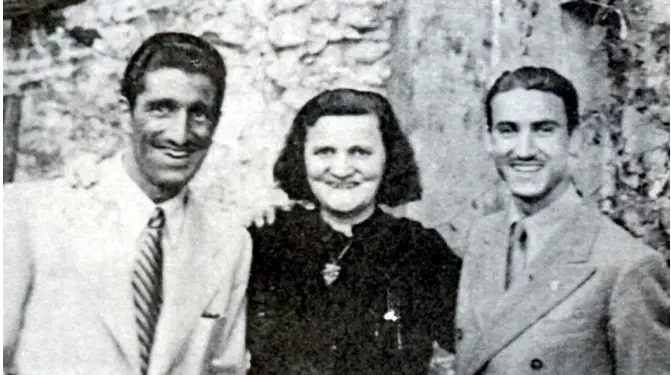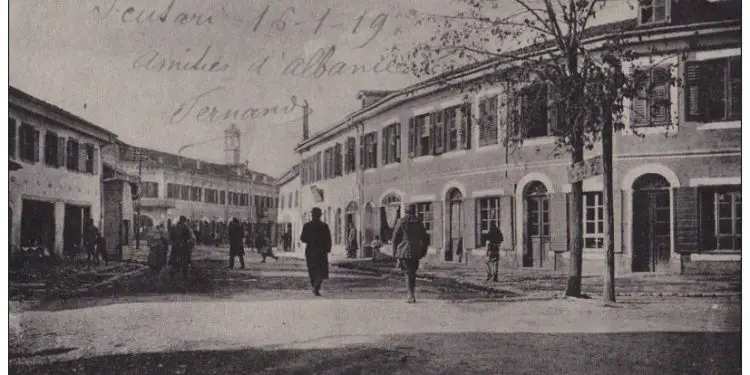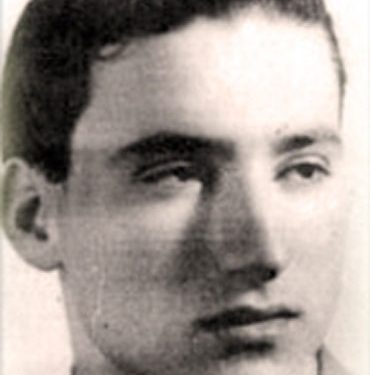Dashnor Kaloçi
Memorie.al/ publishes the unknown story of Arshi Pipë, the famous professor of several US universities, who after being released from prison in 1956, escaped from Albania together with his sister, crossing the Buna River by swimming in the area of Muriqan, with the help of Malo Kraja from Shkodra, who was recommended and introduced by his close friend, Sami Repishti. The whole unknown story of one of the most prominent personalities of the Albanian anti-communist diaspora in the USA, comes through the rare testimonies of his brother-in-law (sister’s husband), Uran Kalakulla, who tells from the origin of the Pipa family, the education of in the capital of the Ottoman Empire, activity after returning to Albania, rejection of Fan Noli’s offer to work in his government, the period of the Zog Monarchy, Arshi’s education at the Jesuit College in Shkodra, graduation from the University of Florence in Italy , appointment as a professor at the Classical Gymnasium of Shkodra and then at the Femnuer Institute “Nana Mbretneshë” in Tirana, refusal to engage in communist and nationalist political formations during the occupation, publication of the literary magazine “Fryma”, arrest and death in torture in the cells of the Internal Affairs Branch of Shkodra, of his brother, lawyer Myzafer Pipa, the arrest and sentencing of Arshiu who implicated him with the “Group of Deputies”, serving the sentence in camps and prisons where he wrote some literary works that he could get out of prison, his escape from Albania with his sister and political asylum in the US where for years he lectured as a professor in various colleges and universities, and until he was escorted to his last home with the greatest honors by the Albanian-American community in July 1997.
It was July 20, 1997, when the death of Professor Arshi Pipë, one of the most famous exponents of the Albanian political diaspora living in the United States, was announced in one of the informative editions on the Voice of America radio. Of America. He was cared for until the last minute at George Town University Hospital in Washington, D.C., and will be buried four days later in one of America’s most famous mortuaries, Gawler’s and Sons Funeral Home. Most recently some of the American presidents, such as Willson, Harding, Eisenhower, Kennedy, etc.
But who was Arshi Pipa, what was his past and why the Albanian community of the USA was preparing to make one of the greatest funerals that could have been done to a man of Arberian blood, from the day when an Albanian from Korça stepped for the first time in the “Promised Land”?!
Pipa family originally from Libohova, educated in Istanbul?
The Pipa family were originally from Libohova in Gjirokastra and their ancestors had not insignificant positions during the period of the Ottoman Empire. One of them, named Reshid, was the Governor of Rumelia, and his two brothers, Tafili and Arshiu, were cadillars (judges). Arshiu’s father was named Mustafa Nuri Pipa and after graduating from the Faculty of Law in Istanbul, he worked as a court president in several cities of the Turkish Empire, such as Samsun, Denizli, Mitili, etc., until 1912, when he returned to Albania. After returning from Turkey to his homeland, Mustafai also worked as a court president in Berat, Tirana and Shkodra. In 1924 he refused Fan Noli the post of Attorney General. Mustafa lived until 1948, when he died in the city of Shkodra at the age of 77. Arshiu’s only brother, Muzaferi, who died in torture at the Shkodra Investigation in 1947, was also a lawyer by profession.
From the Jesuit College in Shkodra, a philosophy student in Florence
Arshiu was born in Shkodra in 1920 and his family took care of his education by enrolling him in the College of the Jesuits of Shkodra, one of the most famous of that time. There he learned the basics of classical culture, learning ancient Greek and Latin, and as a result when he went to the Lyceums of Korça and Tirana, he was one of the most prepared students. Arshiu was lucky to have as his pedagogues, personalities of Albanian education, such as: Hil Mosi, Mirash Ivanaj, Gjergj Canco, Gjergj Kokoshi, Kol Kamësi, Skënder Luarasi etc. After graduating from the classical gymnasium, Arshiu wanted to continue his studies at the University of Montpellier in France, but at that time his mother became seriously ill and was forced to attend the Dubrovnik Senatorium. From this he was forced to register and study in Italy, in order to be able to take care of his mother in Dubrovnik. From the Italian universities, Arshiu chose Florence, the city with cultural and artistic tradition, where one of the oldest universities in the world was located. It was the first time that Arshiu left the family for a long time and for this, years later, in his first poetic volume entitled “Sailors”, he would dedicate one of his most beautiful poems, where among others it states:
“Goodbye my countries /
What is disappearing out of nowhere /
The sea sleeps, the smoke rises /
The boat sways for waves … /
(From the poem “Farewell”).
As a very intelligent man by nature and very studious, in Florence Arshiu gave his all after the lessons of the faculty. In this regard, Arshiu’s sister’s husband, the publicist and former political prisoner, Uran Kalakulla, recalled, among other things: “In Shkodra, since Arshiu was still a high school student, his father, Mustafa, as a very cultured man, was took care to create for the two boys a rich and special library, which Arshiu would enrich while he was a student in Florence.It became one of the most valuable personal libraries in the city of Shkodra and beyond. Unfortunately, she lost along with a lot of loot and furniture from the seizures, during the continuous communist persecution that the family suffered. The Faculty of Philosophy in Florence was four years old, but Arshiu completed it in three years.He returned home there from the middle of 1941 and decided to take the diploma defense exams a year later”.
Lecturer at the Classical Gymnasium of Tirana and the defense of the diploma in Florence
After returning to his homeland in 1941, Arshiu was appointed as a lecturer at the Classical Gymnasium of Tirana, where as soon as he started working there, he opposed the decision of the Ministry of Education to introduce Italian as a compulsory subject in the curriculum. Arshiu was a staunch anti-fascist and never wore the ‘fascist division’ (uniform) that was mandatory for teachers. So was his brother Muzaferi, who at that time for his anti-fascist activity (for open protests against the fascist occupation of the country), had been interned on the island of Ventotene in Italy since 1939. During that school year, Arshiu began to prepare his diploma thesis and in this regard, Uran Kalakulla, said: did not accept it, as he had strong religious inclinations. Arshiu chose the other French philosopher, Henri Bergson. This diploma thesis, which is still preserved today in the family archive, is a genuine philosophical work and with it Arshiu won the degree of Doctor of Science, with the topic “Morality and religions”. In this diploma defense, Arshi Pipa received the highest evaluation, and moreover, was persistently invited by the renowned Florentine university to stay there, first as an assistant professor, and then, according to the procedures, to continue further career ladders. Academic. But the Albanian student Pipa, like many of his compatriots, seeing the need of the country for staff, returned to Albania “.
After graduating in Florence, lecturer at the Classical Gymnasium of Shkodra
In the school year 1942-’43, after a request made by Arshi Pipa to be as close as possible to the family, the Ministry of Education approved and appointed the new professor graduated in Florence, in the gymnasium of Shkodra, where he had once been himself students. During those two years of residence in Shkodra (in 1943 he returned to Tirana), Arshiu was in the most intellectual social circles of the city, which included famous writers, poets, musicians and painters of that time, such as: Qemal Draçini, Kol Mirdita, Ramadan Sokoli, Gaspër Pali, Gac Çuni etc. The reasons for leaving Shkodra to Tirana, according to the memories of Arshiu’s sister, Bedrije (Bedi) in an unpublished diary found in their family in the USA, were the constant requests of Arshiu and Muzafer, near their father. They thought that in Tirana, social opportunities were more efficient in directing their intellectual work. In the capital, Arshiu was appointed to the female high school “Donika Kastrioti”, where she taught Literature and Italian Language. During those years that Arshiu was in Tirana as a lecturer, Uran Kalakulla remembers that he did not interfere and did not participate in any political party. He refused to organize with the National Liberation Movement either, although in the Communist Party he had many of his friends from the Shkodra high school, as well as some cousins like Xhemal Broja. But he did not even approach the National Ball, despite the persistent invitation given to him from time to time by his former classmate Halim Begeja. After the publication of the first volume of poetry “Sailors”, in March 1944, Arshiu began publishing his magazine, entitled “Spirit”. This magazine, which was well received by the public and intellectual circles of the time, filled a gap that the young critic Pipa posed for those with an interest in literary knowledge. Among the main people who collaborated with this magazine, were: Andon Frashëri, prof. Selman Riza, Mitrush Kuteli, Astrit Delvina, Dr. Besim Qorri, Muzafer Xhaxhiu and others.
Transfer to Durrës after debates with the official of the Ministry of Education
In the great blow suffered by the Albanian intelligence that had been educated in the West, in the years 1944-’49, by the communist regime, the Pipa brothers were also targeted. Regarding the reasons for his opposition to the communist regime, Arshiu in his book “Contemporary Albanian Literature” (published in English, New York 1991) explains some passages and events of that time, starting from the discussions in the Writers’ League, until in Durrës, where he was arrested. Regarding these, among other things, he writes: “My discussion in the meeting with Shemsi Totozani (representative of the Ministry of Education), caused me to be demoted, transferring me to the Lyceum of Durrës. My lecture on Migjen was commented on as an act of rebellion. Shortly afterwards, in a ‘poetic evening’ at the House of Culture in Tirana, I recited a lyric translated by Faust (“The Flea Song”), which contained the verses: big star”. About this, a friend told me, that Totozani was fermented. In another poetic evening, this time in Durrës, I recited the lyric “Bushtra”, which was about the death of a mangy dog. Only later, when I was tortured in the dormitories of the State Security of Durrës, did I learn that the bitches were once the Soviet Union and its puppies, the countries of the Communist East, which at that time were called “People’s Democracies”.
Arrest by communists and prison
Regarding Arshiu’s arrest (April 26, 1946), his brother-in-law, Uran Kalakulla, recalls, among other things: “In the first sentence, Arshiu was given two years in prison (where he defended himself without a lawyer), although he did not had joined no anti-communist political formation during or after the War period!. When Arshiu wanted three months to be released from prison, in December 1947, he was taken back and tortured. At that time, his brother Muzafer was killed in the investigation of Shkodra, after severe tortures, where after being burned with a red iron behind his head, he was thrown from the stairs. Meanwhile, Arshiu did not know this and after many tortures, accusing him as a member of the “Group of Deputies”, which included some of his friends, such as Suat Asllani and Musine Kokalari, he was sentenced to 20 years in prison. During the first two years of Arshiu’s imprisonment, the Pipa family was halved, because after the murder of Muzafer’s investigator, his older sister Bedrija also died of tuberculosis. While the elderly father, died on the way with broken legs, when they were taken from one house to another. This caused the family to suffer a total economic collapse, ending up as a street wandering family. During the years of serving his sentence, Arshiu wrote literature and was able to extract from Burrel prison many poems, which he published in two books (‘Prison Book’ and ‘Rusha’) years later when he was in political emigration outside Albania. Arshiu was released from prison in 1956, receiving a reduced sentence after an amnesty was granted when the so-called ‘Koci Xoxes’ group’ was hit in 1949, where he was sentenced to 10 years in prison.
Escape from Albania and professor at US universities
According to the testimony of his brother-in-law, Uran Kalakulla, finding it impossible to live in that miserable condition where their family had become, after voluntarily leaving Arsim (where he worked two or three months after his release from prison), Arshiu decided to escape from Albania. Thus, with the help of a man from Shkodra named Malo Kraja (his friend, Sami Repishti, had recommended him as a guarantor), after they had drawn up the plans in detail, he and his sister Fehime crossed Buna by swim and from Muriqan, crossed the border. State Albania-Yugoslavia, describing the highway in the direction of Bar. It was September 1956, and after two years in Sarajevo, in 1958, Arshiu and his sister won the right to political asylum in the United States. The first two years after doing several different jobs, in 1960, Arshiu began working as a professor of Philosophy and Religion at Philander Smith College, Little Rock, Arkansas. A year later, he headed the Italian department at the Georgetown School of Languages and Linguistics, and at the same time taught Philosophy at this University College of Fine Arts (from the summer of 1961 to the summer of 1962). During this period (1961-’62), he worked as an Italian lecturer at Columbia University and a year later, he was an assistant professor of Italian at Adelphi University, Garden City, while also teaching philosophy at Adelphi Suffolk College. Between 1963 and ‘66, he worked as an assistant professor in the Italian department at the University of California at Berkeley. From 1966 to 1969, he went to Minneapolis (center of the state of Minnesota) to the faculty of that University, as an associate professor (Associate Professor until 1969) and then professor head of the Department of French and Italian. In 1968, Arshiu was awarded a Doctor of Philosophy. He was proficient in French, Italian, English and German. During his years in the US, Arshi Pipa became one of the most famous scientific, political and social personalities of the Albanian political diaspora. After the establishment of pluralism in Albania, he came and visited his country three times, from where he had left for political reasons since 1956. After his death, according to the will he had left, his family threw the ashes of his body on the shores of the Adriatic./Memorie.al




